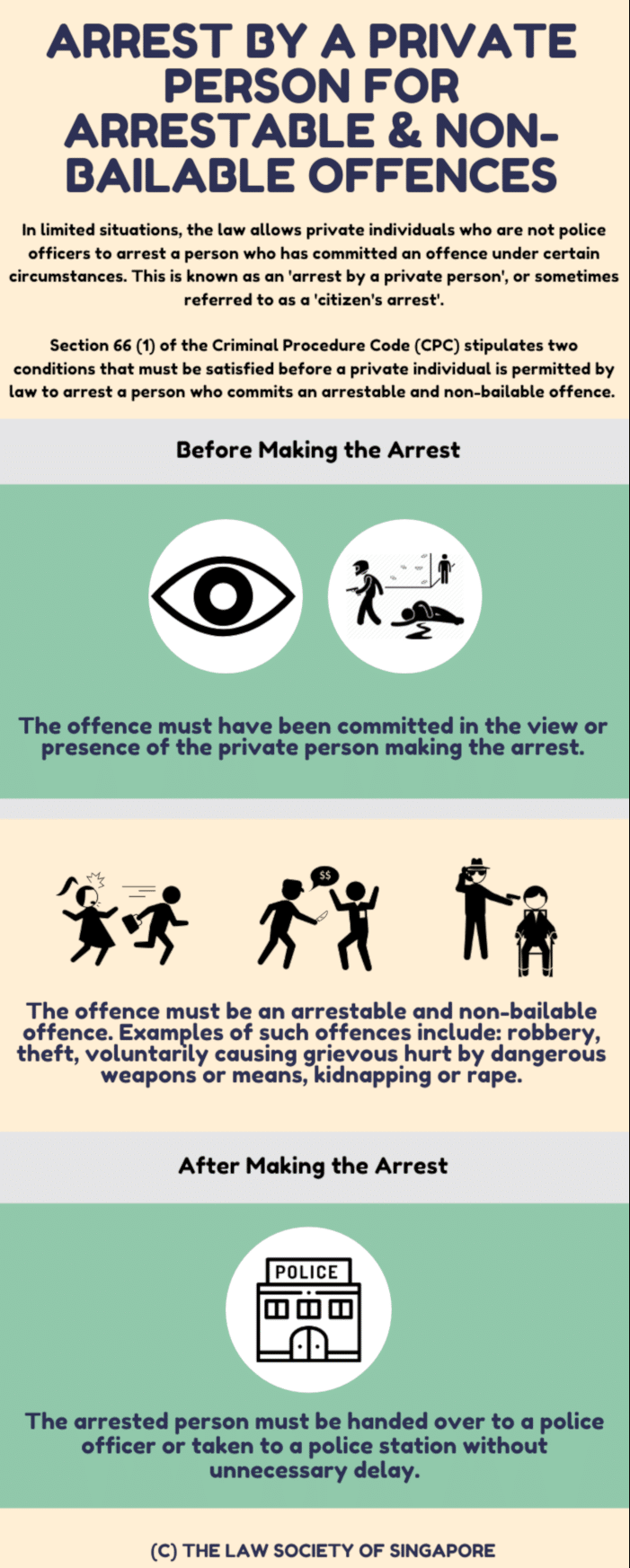Arrest by A Private Person for Arrestable & Non-Bailable Offences
The information in the Legal Fact Check Service is provided as a public service by the Law Society of Singapore. The information presented on this site is strictly for information. It is not legal advice and should not be treated as an alternative to seeking legal advice from your lawyer. The information provided in the Legal Fact Check Service is not a definitive analysis of the subject and professional legal advice should always be taken before any course of action is pursued.
Whilst the information presented is considered to be correct at the date of publication, changes in circumstances after the date of publication may impact on the accuracy of the information. The Law Society of Singapore reserves the right to amend any content at any time, at its sole discretion, without prior notice.
The Law Society of Singapore shall not be held liable for any damage or loss of any kind, howsoever caused as a result (direct or indirect) of the use of the Legal Fact Check Service, including but not limited to any damage or loss suffered as a result of reliance on the contents contained in or available from this site.
Arrest by A Private Person for Arrestable & Non-Bailable Offences
In limited situations, the law allows private individuals who are not police officers to arrest a person who has committed an offence if certain conditions prescribed by law are satisfied. This is known as an ‘arrest by a private person’, or sometimes referred to as a ‘citizen’s arrest’. A common form of ‘citizen’s arrest’ is where a private individual is permitted by law under certain circumstances to arrest a person who commits an arrestable and non-bailable offence.
Fact:
Which law permits a private individual to arrest a person who commits an arrestable and non-bailable offence?
Section 66(1) of the Criminal Procedure Code (“CPC”) provides that a private individual may arrest a person who commits an arrestable and non-bailable offence. The CPC is not to be confused with the Penal Code. The Penal Code does not govern arrests by private persons and only sets out the types of offences punishable by law and the relevant penalties that apply for each offence.
What are the conditions prescribed by law for a private individual to arrest a person who commits an arrestable and non-bailable offence?
Section 66(1) of the CPC stipulates two conditions that must be satisfied before a private individual is permitted by law to arrest a person who commits an arrestable and non-bailable offence:
- The offence must have been committed in the view or presence of the private individual making the arrest.
- The offence which has been committed must be an arrestable and non-bailable offence. Arrestable and non-bailable offences refer to serious offences where police officers are legally empowered to make an arrest without a warrant, and for which the court will not usually grant bail (except on a case-by-case basis). Examples of such offences include: robbery, theft, voluntarily causing grievous hurt by dangerous weapons or means, kidnapping, or rape.
Reference should be made to the First Schedule of the CPC to determine whether an offence is arrestable and non-bailable.
What is required after a private individual arrests a person who commits an arrestable and non-bailable offence?
Under section 66(2) of the CPC, the private person must, without unnecessary delay, hand over the arrested person to a police officer or take the arrested person to a police station.
Are there other forms of arrests by a private individual that are permitted by law?
Yes, other forms of permissible arrests by a private individual are provided for in section 66 of the CPC, but are not covered in this write-up.
The infographic below summarises the key facts regarding when a private individual may arrest a person who commits arrestable and non-bailable offences under section 66 of the CPC.


